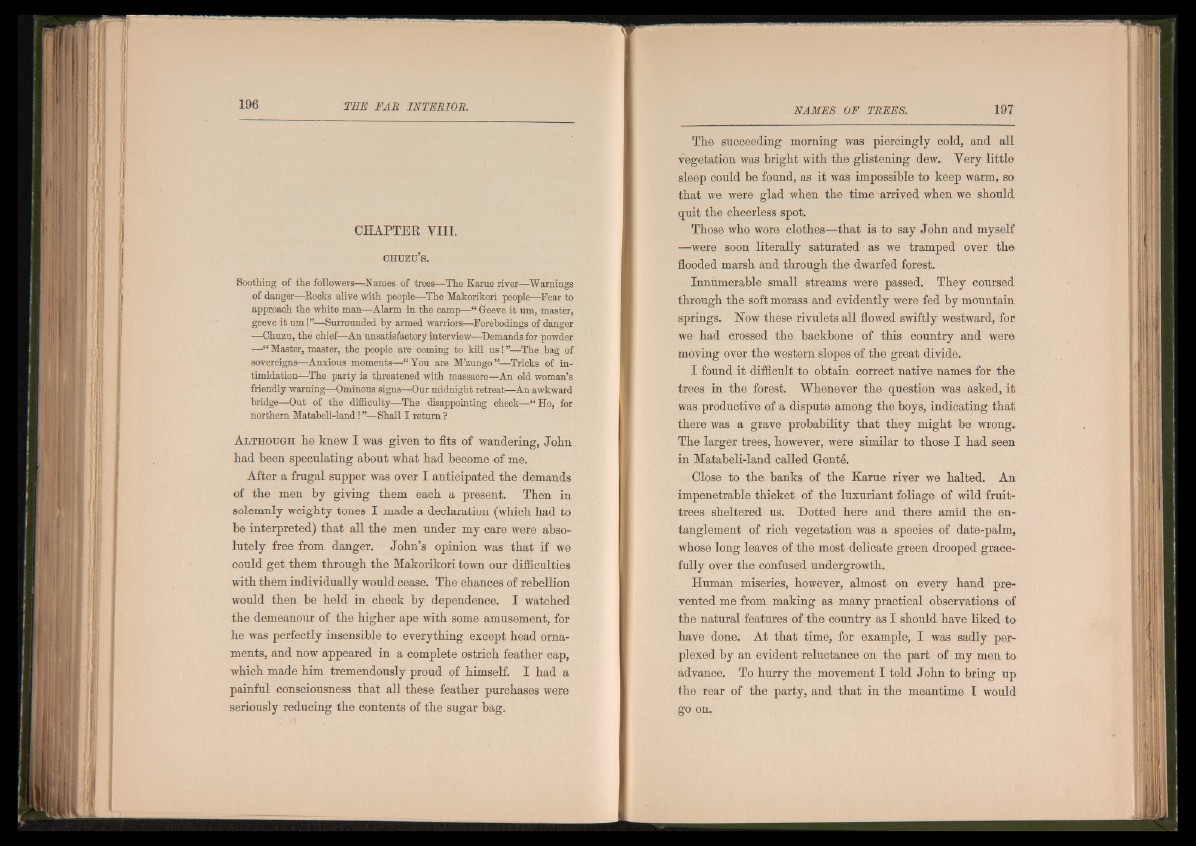
CHAPTER VIII.
CHUZU’S.
Soothing of the followers—Names of trees—The Karue river—Warnings
of danger—Rocks alive with people—The Makorikori people—Rear to
approach the white man—Alarm in the camp—“ (reeve it um, master,
geeve it um!”—Surrounded by armed warriors—Forebodings of danger
—Chuzu, the chief—An unsatisfactory interview—Demands for powder
—“ Master, master, the people are coming to kill u s! ”—The bag of
sovereigns—Anxious moments—“ You are M’zungo”—Tricks of intimidation—
The party is threatened with massacre—An old woman’s
friendly warning—Ominous signs—Our midnight retreat—An awkward
bridge—Out of the difficulty—The disappointing check—“ Ho, for
northern Matabeli-land!”—Shall I return?
A l t h o u g h he knew I was given to fits of wandering, John,
had been speculating about what had become of me.
After a frugal supper was over I anticipated the demands
of the men by giving them each a present. Then in
solemnly weighty tones I made a declaration (which had to
he interpreted) that all the men under my care were absolutely
free from danger. John’s opinion was that if we
could get them through the Makorikori town our difficulties
with them individually would cease. The chances of rebellion
would then be held in check by dependence. I watched
the demeanour of the higher ape with some amusement, for
he was perfectly insensible to everything except head ornaments,
and now appeared in a complete ostrich feather cap,
which made him tremendously proud of himself. I had a
painful consciousness that all these feather purchases were
seriously reducing the contents of the sugar bag.
The succeeding morning was piercingly cold, and all
vegetation was bright with the glistening dew. Very little
sleep could be found, as it was impossible to keep warm, so
that we were glad when the time arrived when we should
quit the cheerless spot.
Those who wore clothes—that is to say John and myself
—were soon literally saturated as we tramped over the
flooded marsh and through the dwarfed forest.
Innumerable small streams were passed. They coursed
through the soft morass and evidently were fed by mountain
springs. Now these rivulets all flowed swiftly westward, for
we had crossed the backbone of this country and were
moving over the western slopes of the great divide.
I found it difficult to obtain correct native names for the
trees in the forest. Whenever the question was asked, it
was productive of a dispute among the boys, indicating that
there was a grave probability that they might be wrong.
The larger trees, however, were similar to those I had seen
in Matabeli-land called G-onte.
Close to the banks of the Karue river we halted. An
impenetrable thicket of the luxuriant foliage of wild fruit-
trees sheltered us. Dotted here and there amid the entanglement
of rich vegetation was a species of date-palm,
whose long leaves of the most delicate green drooped gracefully
over the confused undergrowth.
Human miseries, however, almost on every hand prevented
me from making as many practical observations of
the natural features of the country as I should have liked to
have done. At that time, for example, I was sadly perplexed
by an evident reluctance on the part of my men to
advance. To hurry the movement I told John to bring up
the rear of the party, and that in the meantime I would
go on.